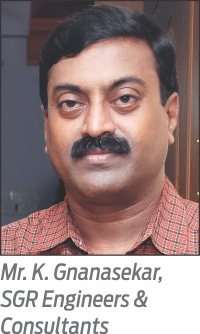The company not only has executed some projects successfully in Africa, but also is convinced of swift upcoming growth of various African nations in terms of infrastructure and energy, giving considerable impetus to wire and cable demand.
Chennai-based SGR Engineers & Consultants is a project consultant for the wire and cable industry providing complete solution from concept to commissioning. The company offer integrated technical consultancy for setting up news plant or plant rebuilds. SGR has done some major work in Africa, especially West Africa in setting up some highly successful cable plants and reviving some old units.
WCI recently interviewed Mr. K. Gnanasekar, SGR Engineers & Consultants to know his views on growth of African countries and opportunities for cable companies therein. Excerpts:
 WCI: Tell us in brief about your company and how do you help setting up the wire and cable projects?
WCI: Tell us in brief about your company and how do you help setting up the wire and cable projects?
K. Gnanasekar: We, SGR Engineers and Consultants (formerly under Saraswathi Industrial Enterprises) are providing complete solution for the wire and cable industry based in Chennai since 2008. Ours is a reliable name in the power cable industry of Africa for offering integrated technical consultancy services.
Setting up manufacturing facility from concept to commissioning based on customers’ need. Project planning and scheduling, preparing machinery and utilities specification, machineries and utilities layouts, selection and sourcing of plant and machinery, trial runs and inspection of machinery at supplier’s end, coordinating installation and commissioning of plant and machinery and preparing specification, and selection and sourcing of raw materials are just a few from our long list of assistance.
Also, providing support in enhancing the existing capacity of the plant, up-gradation of the existing machineries, providing expatriates for regular operations/special needs, arranging partners for JV projects, and handling part project and expansion projects of companies are other areas of SGR’s expertise.
WCI: We are aware of your major works in Africa, especially three projects that you did in Nigeria in a decade. Please describe these projects and the nature of your involvement in these.
KG: Purechem Manufacturing Ltd (Purechem Cables and Wires) is part of the well known “ENPEE GROUP” which first started trading in essential products and commodities in Nigeria since 1961. Purechem started its operation in 1989 with manufacturing of textile auxiliary chemicals and consumer adhesives. Since that time, it has come a long way establishing brands such as TOP BOND, TOP GIT, TOP GUM, TOP FIX etc., which has become a household name in Nigeria and neighboring West African countries.
As part of diversification, they approached us to set up a manufacturing unit to produce copper/aluminum cables and wires in 2009. We were appointed as their consultant for the cable project from concept to commissioning. We successfully executed the project with the state-of-the-art- machinery and laboratory worth more than USD 2.0 million within the time frame.
Within 2 years of commercial production, the management approached us for expansion as they have attained the maximum efficiency. Now, Purechem is capable of manufacturing the entire range of LV power cables with PVC/XLPE up to 630.00 sq.mm and over head conductors as well. They have retained us as their consultant. We are visiting them every quarterly to audit their entire operations and suggest corrective measures.
Klysat Cables and Wires Ltd (KCWL) is another significant project. Engr. Hassan Kuliya Umar, Chairman and CEO of KLYSAT International Ltd., Kaduna, Nigeria dreamt of establishing a cable manufacturing plant in his native state KANO, Nigeria. In my capacity as MD of the plant, we fulfilled his 10 years dream into reality by taking over a sick unit which was producing telephone drop wire. The plant was overhauled to start the production of house wiring cables within a short span by directly importing drawn, annealed copper wires of varies sizes. Simultaneously, work was started for setting up a plant with a capacity to process 1200 tonne of copper and 1500 tonne of aluminum per annum to produce single core house wiring cables, multi -core flat cables, single core/multi core copper LV mains cables, over head conductors etc.
Coleman Technical Industries Limited (CTIL) was yet another feather in the cap. Coleman was initially into trading / distributing of cables and wires produced by Kabelmetal Nigeria Plc., which is the largest manufacturer of cables in the West Africa Sub-Saharan region. Later, Coleman started their own production in 1998 in a very small set up with only an extrusion lines and coilers. Drawn, annealed copper wires to sizes were imported and insulated in the factory initially. The same was revived under the Chairmanship of Asiwaju S. K. Onafowokan in 2000 and proposed by myself who joined as Plant Manager to buy cable machines from India initially to reduce the investment cost. It was accepted readily and gradual expansion (backward integration) took place. The company started growing from a 40 million Naira debt to a profit making centre within a span of 2 years. Now, Coleman is the largest manufacturer of wires and cables of all ranges and types in West Africa.
WCI: It is also said that recommending Indian made machine and components is part of your consultation process. What is the idea behind that?
KG: Most of the clients/customers who show interest in setting up a cable factory in Africa are either a distributor or dealer or RM supplier to a MNC cable plant in their country. These prompts them to set up their own but are financially constrained. We too know it is a capital intensive project. Feeling the pulse of customer and not to let down their enthusiasm, we give them hope by recommending low cost Indian machines which are better in quality and durability than the machines from China as a start-up.
Secondly, it is easy to maintain such machines with the limited resources and technical knowledge available in such places. At the same time, it was an opportunity for me to show the technological advancement of India and to provide market for Indian cable machine manufacturers and break their myth that only the Western world can manufacture such machines. Abundant availability of workforces who worked at various levels in India and are ready to work in Africa as expatriates is also a part of consideration.
Also, suggesting a project with high end, sophisticated machinery to a new comer may not yield positive result at the first instance due to huge inventory on RM, WIP and FG, work forces unable to cope up with the latest technologies, non-availability of spares locally etc.
WCI: As per statistics, the top growth is expected for the wire and cable industry in the African countries followed by India. Do you agree? Please give us some region-wise pointers and data in favor of this forecast.
KG: Yes, Africa regions are expected to grow at higher growth rates due to their current expansion in transmission and distribution projects to meet the growing demand of power in these regions.
In 2010, the McKinsey Global Institute (MGI) described the potential and progress of African economies as “lions on the move”. Today, despite the collapse of global commodity prices and political shocks that have slowed growth in North Africa, Africa’s economic lions are still moving forward. Utilities and construction achieved significant expansion to ensure that industry overall generated 23 percent of Africa’s growth, up from 17 percent in the preceding decade.
In the long term, three powerful positive trends are likely to sustain Africa’s growth. First, the continent has a young population with a growing labor force – a highly valuable asset in an ageing world. In 2034, Africa is expected to have the world’s largest working-age population of 1.1 billion. Second, Africa is still urbanizing and much of the economic benefit lies ahead. Productivity in cities is three times as high as in rural areas and, over the next decade, an additional 187 million Africans will live in cities, according to the United Nations. This urban expansion is contributing to rapid growth in consumption by households and businesses.
Third, African economies are also well positioned to benefit from rapidly accelerating technological change that can unlock growth and leapfrog the limitations and costs of physical infrastructure in important areas of economic life. The turbulence – both economic and political – in parts of the continent in recent years has doubtless been a shock, but it has not derailed Africa’s growth story. The IMF still forecasts that Africa will be the second-fastest growing region in the world between 2016 and 2020 with annual growth of 4.3 percent.
WCI: What according to you are the strong growth drivers for the wire and cable consumption in various African markets?
KG: By now, most investors and businesses know about the tremendous potential of Africa—the world’s second-fastest-growing region, topped only by emerging Asia. It may come as a surprise that Africa’s growth is fueled not by resources but rather by a rising consumer market.
The continent’s consumer-facing industries are expected to grow by USD 400 billion, representing its single-largest business opportunity, by 2020. But many companies don’t know how to translate this potential into action, because of a dearth of market research. There is a serious boom in infrastructure, construction, mining, generation-transmission-distribution of power, and rural electrification rapidly transforming Africa into an industrial hub. These necessitate the consumption for wires and cables.
WCI: How do you see the Indian companies’ engagement in future with African countries in terms of setting up plants and projects? What’s the current status of such engagements and do you think such investments would have good returns, given the political instability and fiscal crises as major hindrances in various African nations?
KG: Africa is a place where there is abundant potential. The market is dominated by low voltage cables comprising approximately 92 percent of the total electrical cable market, with high voltage cables at 2 percent and medium voltage cables at 6 percent. It is a sad situation where we are unable to see the footprints of any major Indian cable manufacturer whereas you will find Nexans in Nigeria and Ghana, and Midal in Mozambique to name a few. However, there are few Indian entrepreneurs too who have established cable factories and running them successfully in many African countries.
I would suggest the major players in India that they should not be thinking only of Gulf region and must focus on Africa where there is huge market, which has less competition and which offers better profit margins. I would rather suggest companies to bypass high-profile megacities such as Cairo, Johannesburg, Lagos, Nairobi etc., for mid tier cities like Abidjan, Kano, Mombasa, Rabat etc. They can better tailor products to local markets if they understand what quality means for African customers and know their preferences.
WCI: Tell us you major engagements with the Indian market and markets other than Africa.
KG: Our core market is West Africa. However, we do advisory service to a power cable plant, a conductor plant and an OFC plant. In addition to this, we are currently engaged in setting up a plant in Rourkela, Orissa and Gummidipoondi, in the outskirts of Chennai.
WCI: You may add something if you wish.
KG: We have received numerous awards and recognition for the major works done in West Africa and elsewhere – received “Quality Award” from Director General of Standards Organization of Nigeria (SON); received “DINMA”, Development In Nigeria Merit Award from PSR Magazine, Nigeria; received “Engineer’s Day Award” from Prof. Dr. G. Sriram, Dean, SCSVMV University (Kanchi University- formed under the aegis of Sri Kanchi Kamakoti Peetam Trust), Kanchipuram, TN; received “Best Entrepreneur Award” from Shri A. C. Shanmugam, Chancellor, Dr. M. G. R. Educational and Research Institute University, Chennai. SGR Engineers and Consultants wishes to continue its journey of excellence in pioneering new, successful projects for the wire and cable industry.




